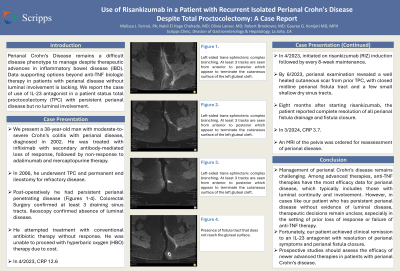Monday Poster Session
Category: IBD
P2704 - Use of Risankizumab in a Patient with Recurrent Isolated Perianal Crohn's Disease Despite Total Proctocolectomy: A Case Report
Monday, October 28, 2024
10:30 AM - 4:00 PM ET
Location: Exhibit Hall E

Has Audio

Melissa J. Ferrari, PA
Scripps Clinic
La Jolla, CA
Presenting Author(s)
Melissa Ferrari, PA1, Nabil El Hage Chehade, MD2, Olivia Lanser, MD3, Robert Brookover, MD1, Gauree Konijeti, MD, MPH1
1Scripps Clinic, La Jolla, CA; 2Scripps Clinic, San Diego, CA; 3Scripps Green Hospital, La Jolla, CA
Introduction: Isolated perianal Crohn’s disease (CD) remains a challenging disease phenotype to manage despite therapeutic advances in IBD. Data supporting options beyond anti-TNF therapy in patients with perianal disease without luminal involvement is lacking. We report successful use of an IL-23 antagonist in a patient status post-total proctocolectomy (TPC) with recurrent isolated perianal disease without luminal involvement.
Case Description/Methods: Patient is a 38-year-old Caucasian man with a history of CD with perianal penetrating disease since 2002, with secondary antibody-mediated loss of response to infliximab in 2004, and subsequent primary non-response to combination adalimumab and mercaptopurine therapy, eventually requiring TPC/end-ileostomy in 2006. After surgery, the patient still reported intermittent fistula drainage. In 2020, evaluation by colorectal surgery confirmed recurrent perianal CD with 1 complex left-sided perianal fistula and multiple sinus tracts. However, team was unable to identify any perianal abscess or tract amenable to seton. An ileoscopy and CT abdomen/pelvis with IV contrast confirmed absence of active luminal disease. Due to non-response to multiple antibiotic regimens, attempt was made to pursue hyperbaric oxygen (HBO) therapy but limited due to prohibitive cost. In 2023, patient developed moderate to severe fistula drainage leading to IV Risankizumab (RIZ) initiation with complete perianal fistula closure following induction and continued maintenance therapy every 8 weeks. At last follow-up, 14 months following RIZ initiation, the patient reported stable ongoing perianal fistula closure without drainage, and rectal examination confirmed a healed cutaneous scar from prior TPC, with closed midline perianal fistula tract and a few small shallow dry sinus tracts. An MRI of the pelvis is pending.
Discussion: Isolated complex perianal CD without luminal involvement, particularly in the setting of diversion as in the case of our patient, is uncommon. Diagnosis can be challenging in this case as traditional IBD approaches of antibiotics and advanced medical therapy, such as anti-TNF therapy, is often pursued. Our patient previously failed 2 TNF therapies, but fortunately achieved remission of perianal disease with an IL-23 antagonist, suggesting this may be another effective approach to management of this patient population. Future prospective studies should examine whether newer advanced therapies are effective for perianal CD.
Disclosures:
Melissa Ferrari, PA1, Nabil El Hage Chehade, MD2, Olivia Lanser, MD3, Robert Brookover, MD1, Gauree Konijeti, MD, MPH1. P2704 - Use of Risankizumab in a Patient with Recurrent Isolated Perianal Crohn's Disease Despite Total Proctocolectomy: A Case Report, ACG 2024 Annual Scientific Meeting Abstracts. Philadelphia, PA: American College of Gastroenterology.
1Scripps Clinic, La Jolla, CA; 2Scripps Clinic, San Diego, CA; 3Scripps Green Hospital, La Jolla, CA
Introduction: Isolated perianal Crohn’s disease (CD) remains a challenging disease phenotype to manage despite therapeutic advances in IBD. Data supporting options beyond anti-TNF therapy in patients with perianal disease without luminal involvement is lacking. We report successful use of an IL-23 antagonist in a patient status post-total proctocolectomy (TPC) with recurrent isolated perianal disease without luminal involvement.
Case Description/Methods: Patient is a 38-year-old Caucasian man with a history of CD with perianal penetrating disease since 2002, with secondary antibody-mediated loss of response to infliximab in 2004, and subsequent primary non-response to combination adalimumab and mercaptopurine therapy, eventually requiring TPC/end-ileostomy in 2006. After surgery, the patient still reported intermittent fistula drainage. In 2020, evaluation by colorectal surgery confirmed recurrent perianal CD with 1 complex left-sided perianal fistula and multiple sinus tracts. However, team was unable to identify any perianal abscess or tract amenable to seton. An ileoscopy and CT abdomen/pelvis with IV contrast confirmed absence of active luminal disease. Due to non-response to multiple antibiotic regimens, attempt was made to pursue hyperbaric oxygen (HBO) therapy but limited due to prohibitive cost. In 2023, patient developed moderate to severe fistula drainage leading to IV Risankizumab (RIZ) initiation with complete perianal fistula closure following induction and continued maintenance therapy every 8 weeks. At last follow-up, 14 months following RIZ initiation, the patient reported stable ongoing perianal fistula closure without drainage, and rectal examination confirmed a healed cutaneous scar from prior TPC, with closed midline perianal fistula tract and a few small shallow dry sinus tracts. An MRI of the pelvis is pending.
Discussion: Isolated complex perianal CD without luminal involvement, particularly in the setting of diversion as in the case of our patient, is uncommon. Diagnosis can be challenging in this case as traditional IBD approaches of antibiotics and advanced medical therapy, such as anti-TNF therapy, is often pursued. Our patient previously failed 2 TNF therapies, but fortunately achieved remission of perianal disease with an IL-23 antagonist, suggesting this may be another effective approach to management of this patient population. Future prospective studies should examine whether newer advanced therapies are effective for perianal CD.
Disclosures:
Melissa Ferrari indicated no relevant financial relationships.
Nabil El Hage Chehade indicated no relevant financial relationships.
Olivia Lanser indicated no relevant financial relationships.
Robert Brookover indicated no relevant financial relationships.
Gauree Konijeti: Abbvie – Advisory Committee/Board Member, Consultant. Lilly – Consultant, Speakers Bureau. Pfizer – Advisory Committee/Board Member. Takeda – Speakers Bureau.
Melissa Ferrari, PA1, Nabil El Hage Chehade, MD2, Olivia Lanser, MD3, Robert Brookover, MD1, Gauree Konijeti, MD, MPH1. P2704 - Use of Risankizumab in a Patient with Recurrent Isolated Perianal Crohn's Disease Despite Total Proctocolectomy: A Case Report, ACG 2024 Annual Scientific Meeting Abstracts. Philadelphia, PA: American College of Gastroenterology.
